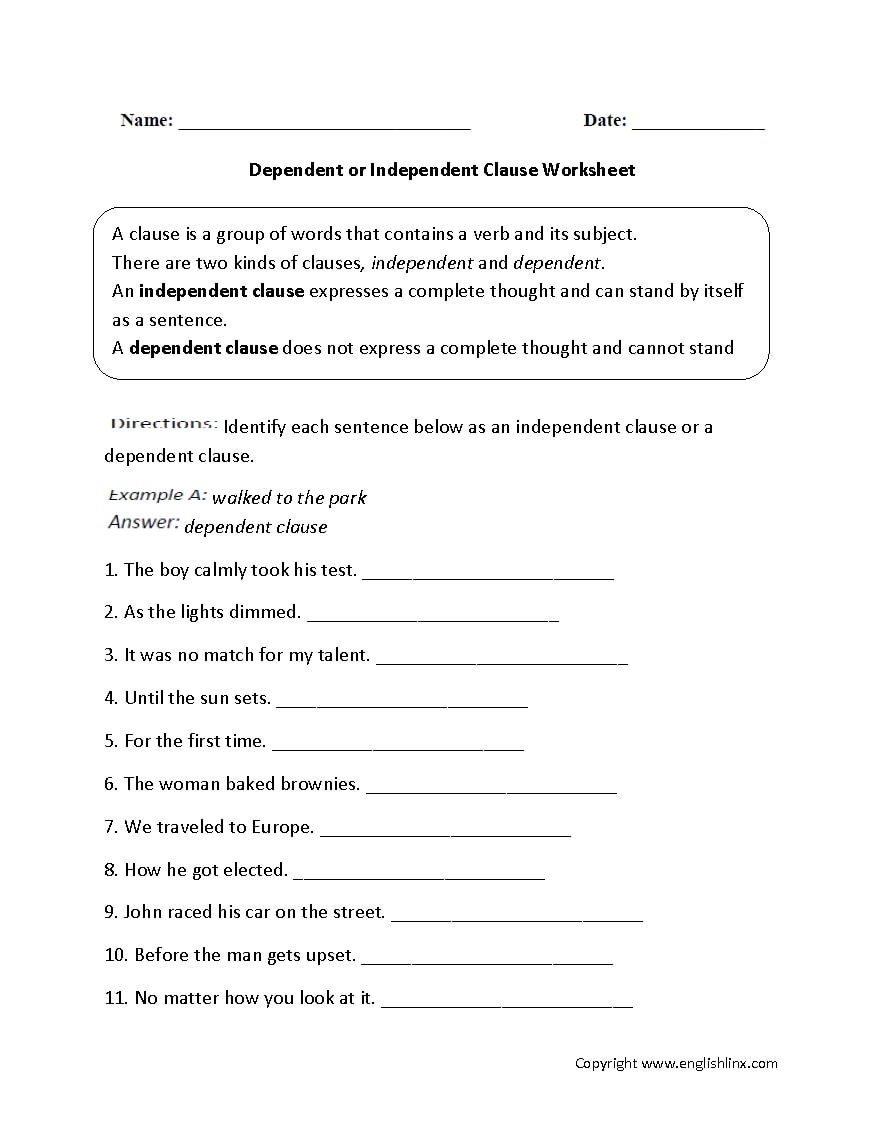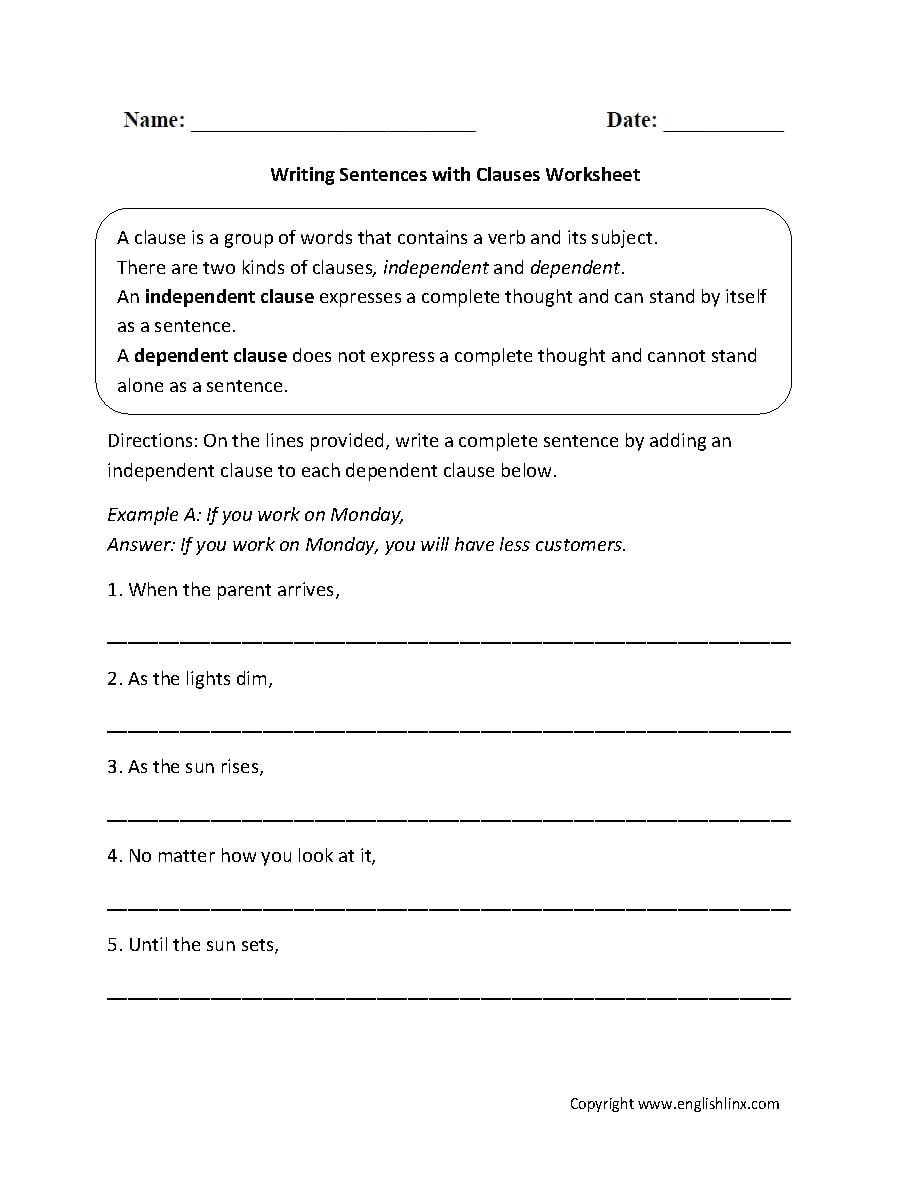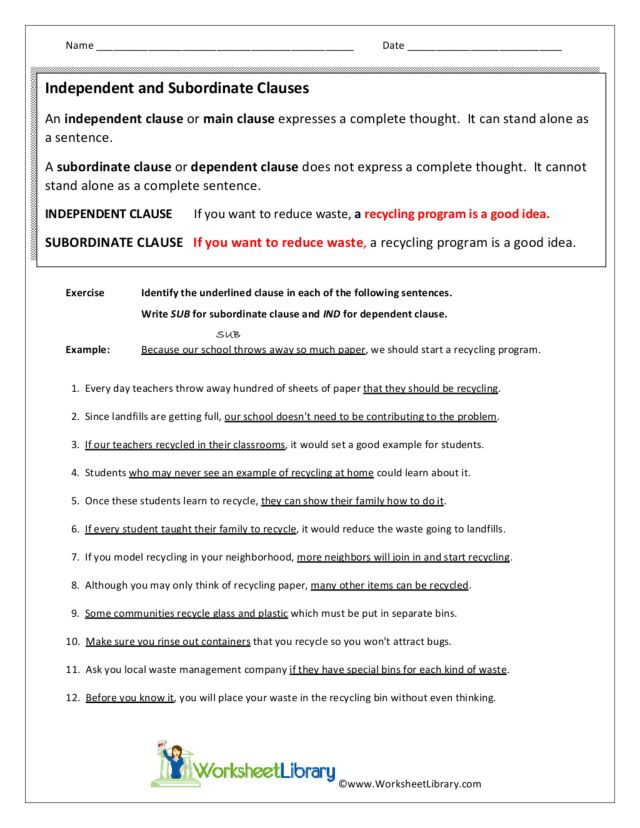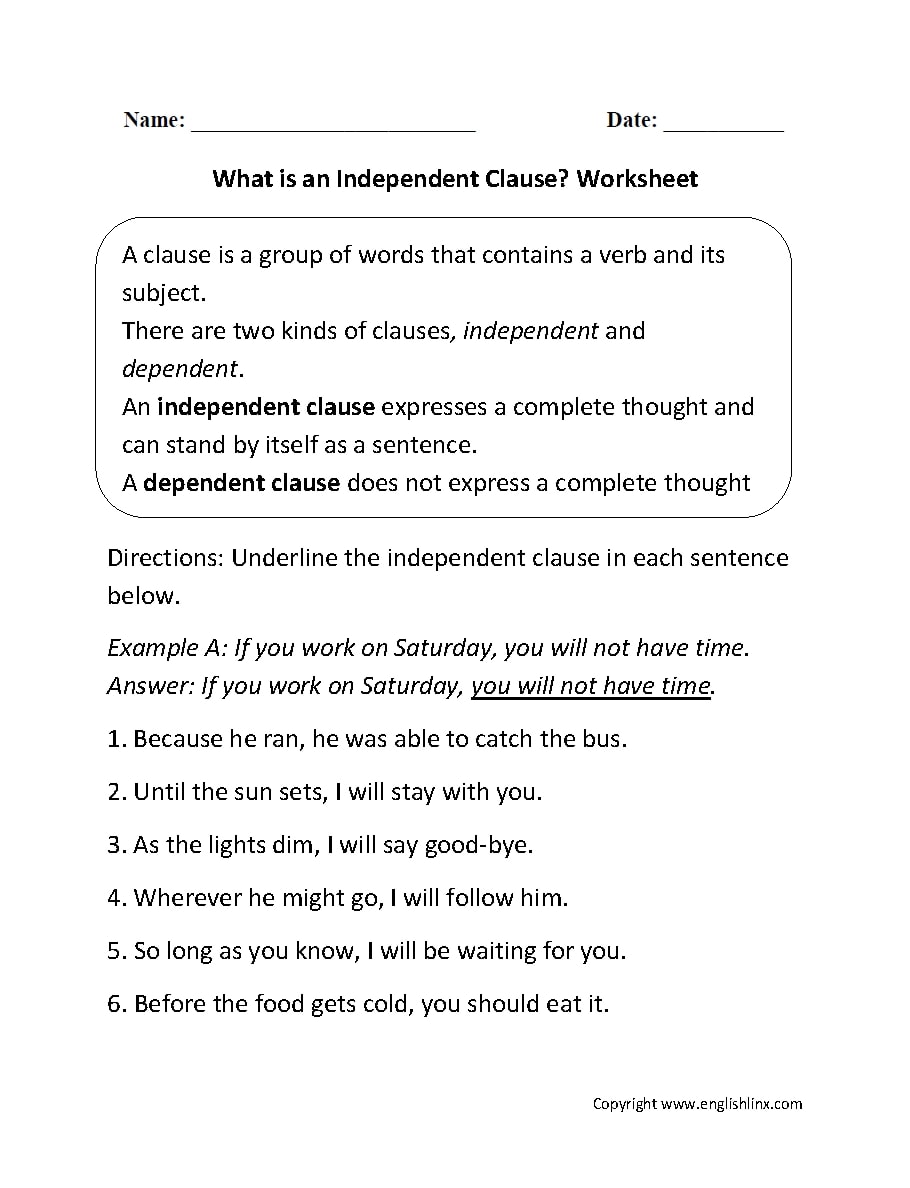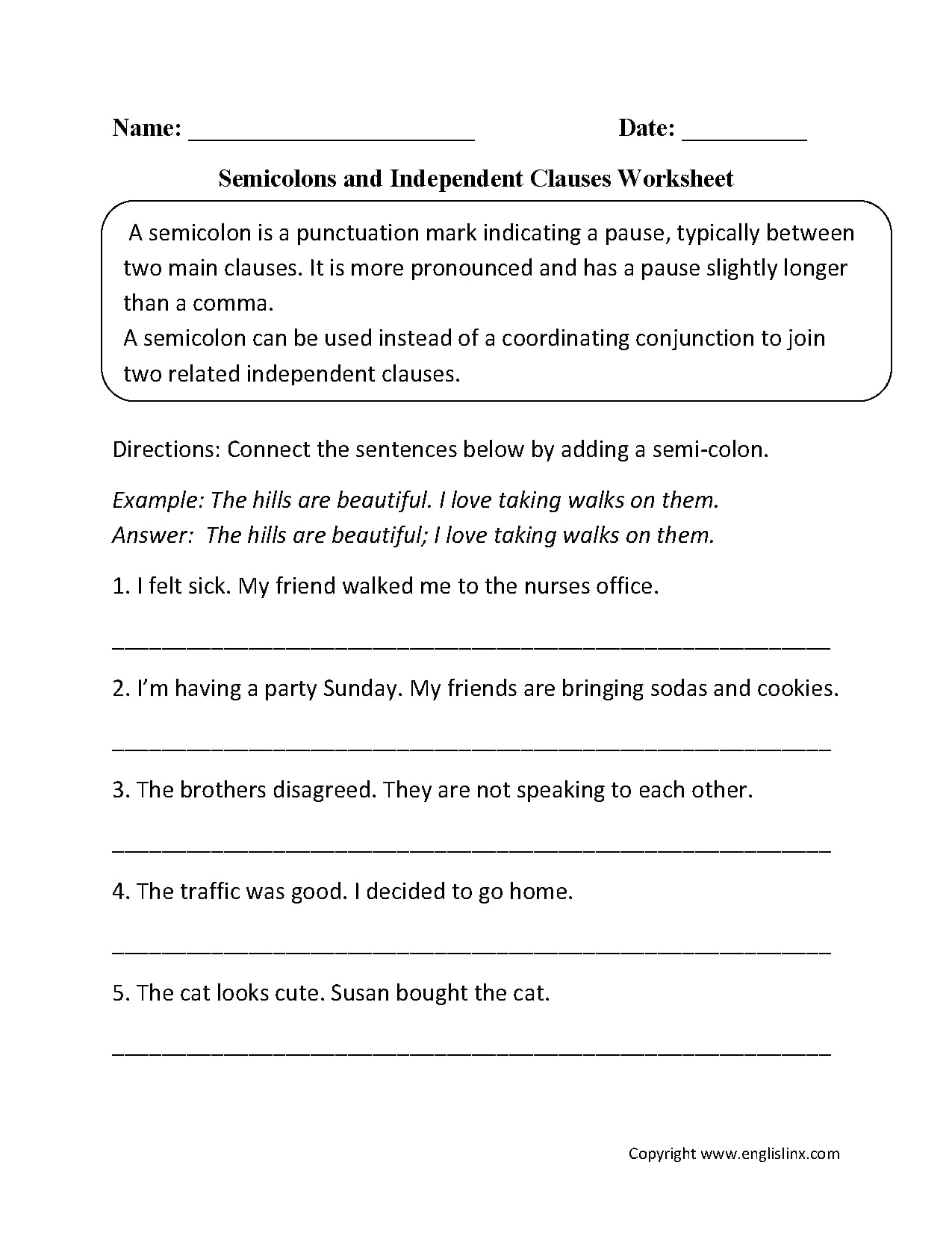Independent Clause
We all know that communication is key. Misinterpretation in writing is usually caused by different factors, one of which includes poor sentence structure. To understand how this works, we get acquainted with the different types of clauses. We are going to tackle the likes of an independent clause.
Independent Clause Worksheet Example
Writing Independent Clauses Worksheet Example
Joining Independent Clauses
In most cases, writers add a dependent clause to an independent clause to form a complete thought. By properly combining these clauses together, you can create a different sentence structure that goes beyond the typical. And when we say “typical,” we mean the kind of sentences that fits the 2nd-grade learning standards of grade schoolers.
Apart from grammar, the proper use of punctuation marks is another element to focus on. Joining two or more clauses together can be quite tricky, especially if you are unsure of how to punctuate different sentence formations. This could either change the overall thought of the sentence or make it a lot more difficult for a reader to comprehend.
Example:
The room smelled like coffee because it was early morning.
The sentence above contains both an independent clause and a dependent clause. If we take away the word because, then it will then form two sentences.
The room smelled like coffee. It was early morning.
We’re now left with two independent (but related) clauses, each creating its own sentences. But since these two thoughts are somewhat related with one another, we can connect the two without altering its clause type.
The room smelled like coffee; it was early morning.
What initially started as a sentence containing an independent clause and a dependent clause has now turned into a sentence with two independent clauses. Here, the use of a semicolon to join clauses, which shall be explained later on, is a simple way to construct a compound sentence.
Using Semicolons
Besides the use of dependent markers or conjunctions, independent clauses may also be combined by a semicolon. However, this may only be applied if the clauses indicated in the sentence consist of related ideas.
Examples:
- Monica brought the utensils; Chandler brought the soft drinks and beer.
- My little sister refuses to go to bed early; she’s afraid she’ll miss something important.
- Jessica is going to her uncle’s cabin; she intends to stay there for the rest of the week.
- There was a slight rainfall at the beach yesterday; Drew and I managed to have an awesome time anyway.
- During their hike last weekend, Jack and Ben noticed a storm moving in; they decided to turn back.
- I was very sad; I watched a chick flick and ate a tub of ice cream.
- This is one of my favorite movies; The Great Gatsby is another favorite.
- The lane is narrow; the road is wide.
Independent Clause Worksheet for All Example
Learning Independent Clauses Worksheet Examples
Semicolon and Independent Clause Worksheet Example
What Is an Independent Clause?
An independent clause is a kind of clause. It is a group of words that contains a subject and verb and expresses a complete thought. An independent clause contains a subject, a verb and a predicate to complete it. A sentence with an independent clause can stand alone.
How to Use Independent Clause
There are a lot of ways to make do with independent clauses in a sentence. Differentiating the two types of clauses will also help you when formulating your complete sentences. The ones listed below are guidelines to help you write a good independent clause and to figure out how.
Step 1: Independent Clause in Simple Sentences
Even in simple sentences, you are still able to use independent clauses or you are still able to see independent clauses. The main key here when writing in simple sentences is the independent clause where your sentence can stand on its own. Without making it look lacking.
Step 2: Independent Clause in Compound Sentences
For compound sentences, we know for a fact that it takes two simple independent clauses to complete a compound sentence. Both independent clauses are connected by a conjunction. When separating compound sentences, you simply take apart through the conjunction. It is quite simple.
Step 3: Independent Clause in Complex Sentences
To form a complex sentence you will need two independent clauses and a dependent clause. Complex sentences that have independent clauses are often written side by side. You can tell when they are independent when you separate them from the sentence and they still make sense.
Step 4: Independent Clause Using Semicolons
To identify an independent clause in your complex and compound sentences, you can also identify them through the use of a semicolon. Semicolons divide two or more independent clauses in a sentence and dependent clauses as well. However, be careful which of these clauses are independent or dependent.
FAQs
What is an independent clause?
An independent clause is a type of clause that can stand alone in a sentence. A group of words or phrases that contain a complete thought and through subject, verb, and predicate. Independent clauses differ from dependent clauses and can be determined in the sentence by a lot of different ways.
What is the difference between an independent clause and a dependent clause?
The difference between an independent clause and a dependent clause is, a dependent clause cannot stand alone in a sentence. A dependent clause when separated from the sentence will be considered a fragment as it needs a subject or a predicate to be complete. An independent clause however can stand on its own. It does not need to have any help to make it make sense in a sentence.
Why is it important to know the use of an independent clause?
When writing sentences, you know for a fact that you will need to understand that independent clauses have a purpose and uses in your sentence construction. Understanding their purpose and their uses is also important. It helps you identify that they can also be made into newer sentences.
When writing new sentences, you will encounter these kinds of clauses. Both the independent and the dependent clause. It is always best to be aware of these types of clauses and see what they can do to your sentences. Independent clauses are the types of clauses that can stand alone. Getting a good idea of how you are able to use independent clauses can help you when you are writing or making new sentences.



